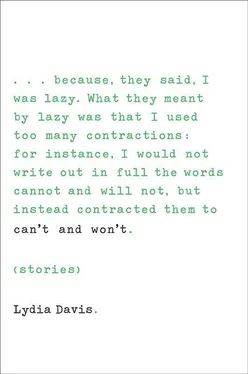* * *
Her visit, that time — now I don’t know why it seemed so complicated. You just go out and do something together, or sit and talk if you stay inside. Talking would have been easy enough, since she liked to talk. Of course it’s too simple to say that she liked to talk. There was something frantic about the way she talked. As though she were afraid of something, fending something off. After she died, that was one thing we all said — we used to wish she would stop talking for a while, or talk a little less, but now we would have given anything to hear her voice.
I wanted to talk, too, I had things to say in answer to her, but it wasn’t possible, or it was difficult. She wouldn’t let me, or I would have to force my way into the conversation.
I wish I could try again — I wish she would come and visit again. I think I would be calmer. I’d be so glad to see her. But it doesn’t work that way. If she came back, she’d be back for more than just a little while, and maybe I wouldn’t know what to do, after all, any better than the last time I saw her. Still, I’d like to try.
Another present was a board game involving endangered species. A board game — there was that optimism again. Or she was doing what our mother used to do — giving me something that required another person, so that I would have to bring another person into my life. I actually meet plenty of people, I even meet them traveling. Most people are basically pretty friendly. It’s true that I still live alone, I’m just more comfortable that way, I like having everything the way I want it. But having a board game wasn’t going to encourage me to bring someone home to play it with me.
* * *
There aren’t that many of us in the car, though more than I would have expected on this particular day. Of course I think they’re all on their way to some place that’s welcoming and friendly, where people are waiting for them with things to eat and drink, like little sausages and eggnog. But that may not be true. And they may be thinking the same thing about me — if they are thinking anything about me.
And some of them who may not be going anywhere special may be glad, though that’s a little hard to believe, because you’re made to feel, by all the hype, by all the advertising, really, but also by the things your friends say, that you should be somewhere special, with your family, or with your friends. If you’re not, you get that old feeling of being left out, another feeling you learned when you were a child, in school probably, at the same time that you learned to get excited seeing all those wrapped presents, no matter what you eventually found in them, besides what you wanted.
I’m not as cheerful as I used to be, I know. A friend of mine said something about it, after I lost both of them, three weeks apart, that summer: he said, your grief spreads into all sorts of different areas of your life. Your grief turns into depression. And after a while you just don’t want to do anything. You just can’t be bothered.
Another friend — when I told him, he said, “I didn’t know you had a sister.” So strange. By the time he found out I had a sister, I no longer had a sister.
It’s beginning to rain, little drops driven sideways across the windowpane. Streaks and dots across the glass. The sky outside is darker and the lights in the car, the ceiling light and the little reading lights over the seats, seem brighter. The farms are passing now. There’s no wash hanging out, but I can see the clotheslines stretched between the back porches and the barns. The farms are on both sides of the tracks, there are wide-open spaces between them, the silos far apart over the landscape, with the farm buildings clustered around them, like churches in their little villages in the distance.
* * *
Sometimes the grief was nearby, waiting, just barely held back, and I could ignore it for a while. But at other times it was like a cup that was always full and kept spilling over.
For a while, it was hard for me to think or speak about one of them separate from the other. For a while, though not anymore, they were always linked together in my mind because they died so close to each other in time. It was hard not to imagine her waiting for him somewhere, and him coming. We were even comforted by it — we imagined that she would take care of him, wherever they were. She was younger and more alert than he was. She was taller and stronger. But would he be pleased, or would he be annoyed? Would he want to be by himself?
I didn’t even know if he wanted me to stay there next to the bed while he was dying. I had taken the bus to the city where he and my mother lived, to be with him. There would be no chance of recovery, for him, or going back from where he was, because they had stopped feeding him. He wasn’t speaking or hearing, or even seeing, anymore, so there was no way to know what he wanted. He didn’t look like himself. His eyes were half open, but they didn’t see anything. His mouth was half open. He didn’t have his teeth in. Once, I put a little wet sponge to his lower lip, because of the dryness, and his mouth clamped shut on it suddenly.
You think you should sit with someone who is dying, you think it must be a comfort to them. But when he was alive, when we lingered at the dinner table, or in the living room talking and laughing, after a while he always got up and left us and went into his own room. Later, when he was doing the dishes, he would say no, he didn’t want any help. Even when we were visiting him in the nursing home, after an hour or two he would ask us to leave.
Our mother consulted a psychic, later, after they were gone, to see if she could get in touch with them. She didn’t really believe in that sort of thing, but some friend of hers had recommended this psychic and she thought it might be interesting and couldn’t hurt to try, so she met with her and told her things about them, and let her try to communicate with them.
The woman said she reached both of them. Our father was agreeable and cooperative, though he didn’t say much, something noncommittal, that he was “all right.” My mother thought that after the trouble they had gone to, to reach him, he might have said more. But our sister turned away and was cross, and didn’t want to have anything to do with it. We were very interested in this, even though we had trouble believing it. We felt that at least the psychic believed it and thought she had had that experience.
The two kinds of grief were different. One kind, for him, was for an end that came at the right time, that was in the natural order of things. The other kind of grief, for her, was for an end that came unexpectedly and much too soon. She and I were just beginning a good correspondence — now it will never continue. She was just beginning a project of her own that meant a lot to her. She had just rented a house near us where we would be able to see her much more often. A different phase of her life was just beginning.
* * *
Strange, the way things look when you’re watching them out a train window. I don’t get tired of that. Just now I saw an island in the river, a small one with a grove of trees on it, and I was going to look more carefully at it, because I like islands, but then I looked away for a moment and when I looked back it was gone. Now we’re passing some woods again. Now the woods are gone and I can see the river again and the hills in the distance. The things close to the tracks flash by so fast, and the things in the middle distance flow past more quietly and steadily, and the things in the far distance stay still, or sometimes they seem to be moving forward, just because the things in the middle distance are moving backward.
Actually, even though things in the far distance seem to be staying still, or even moving forward a little, they are moving back very slowly. Those treetops on a hill in the far distance were even with us for a while, but when I looked again, they were behind us, though not far behind.
Читать дальше












